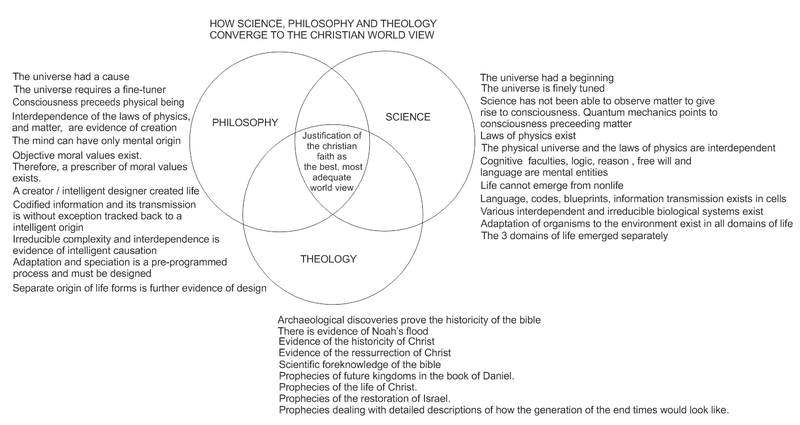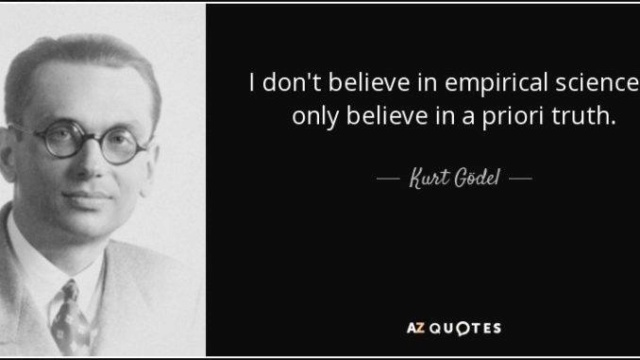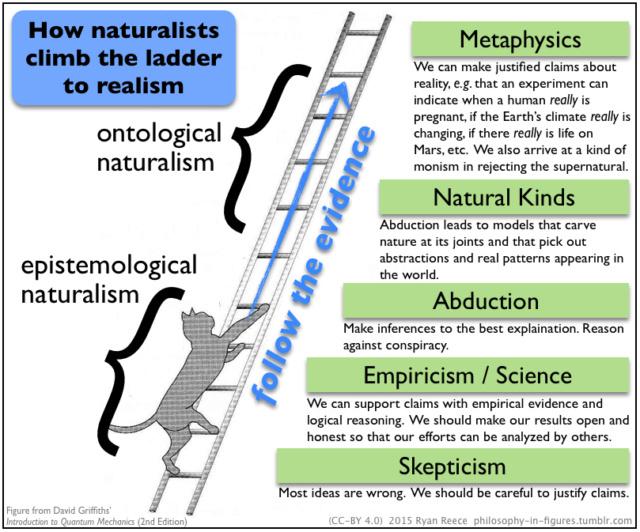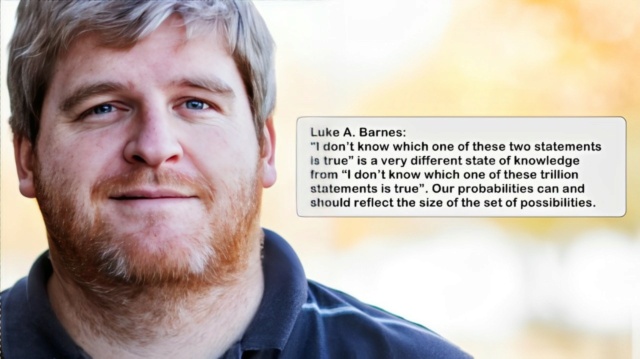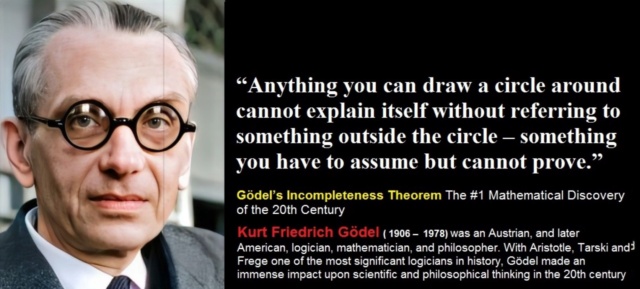https://reasonandscience.catsboard.com/t1759-scientism-verificationism-and-the-quest-of-a-sound-epistemological-approach-to-find-truth-in-regards-of-origins
Origins questions requires three things:
The first can be relearned, the second can be acquired, but the third is the most difficult because only the individual can find it in and for himself.
And he must find it by himself.
’I am very astonished that the scientific picture of the real world around me is very deficient. It gives us a lot of factual information, puts all of our experience in a magnificently consistent order, but it is ghastly silent about all and sundry that is really near to our heart that really matters to us. It cannot tell us a word about red and blue, bitter and sweet, physical pain and physical delight; it knows nothing of beautiful and ugly, good or bad, God and eternity. Science sometimes pretends to answer questions in these domains but the answers are very often so silly that we are not inclined to take them seriously.’
Erwin Schroedinger’
The problem of many atheists is that they have not developed an epistemological framework that is consistent. Very frequently, they ask God to prove himself to them, in order to believe. Or they claim that science provides all relevant answers. Can science measure thoughts? Logic? Truth? Empiricism is a failure as a worldview. The assertion that only things we can measure, touch, taste, hear, or smell are reality, is absurd and demonstrably false. The key component of the supernatural is that it occurs at the will of an undetectable persona. Will and intention cannot be measured or predicted.
We need to endorse a worldview that makes sense, and is a consequence of a carefully chosen and elaborated methodology of an epistemological framework, and applied to do a consistent, correct to the case research, and coming to meaningful, and the most accurate possible conclusions in regards of origins and reality. There are several ways, like rationalism, empiricism, pragmatism, authority, and revelation. Empiricism is a cornerstone of the scientific
method. Empiricism, in philosophy, is the view that all concepts originate in experience, that all concepts are about or applicable to things that can be experienced, or that all rationally acceptable beliefs or propositions are justifiable or knowable only through experience. Can or should we use the scientific method and empiricism alone where the scientific method is the primary epistemology for truth claims? This approach is based on observations
of the world, but philosophy and theology are a priori rejected outhand. That is one of the wrong approaches that many unbelievers in God adopt.
William Lane Craig Religious Epistemology
https://www.bethinking.org/truth/religious-epistemology
W.L.Craig: Positivists championed a Verification Principle of meaning, according to which an informative sentence, in order to be meaningful, must be capable in principle of being empirically verified. 5
Under criticism, the Verification Principle underwent a number of changes, including its permutation into the Falsification Principle, which held that a meaningful sentence must be capable in principle of being empirically falsified.
The statement “In order to be meaningful, an informative sentence must be capable in principle of being empirically verified/falsified” is itself incapable of being verified or falsified.
The inadequacies of the positivistic theory of meaning led to the complete collapse of Logical Positivism during the second half of the twentieth century, helping to spark not only a revival of interest in Metaphysics but in Philosophy of Religion as well. Today’s Flew’s sort of challenge, which loomed so large in mid-century discussions, is scarcely a blip on the philosophical radar screen.
If someone is asking for 100 per cent, to truly know that God exists, we need to remind them this is unrealistic. We believe lots of things with confidence even though we do not have absolute certainty. 2
'"It is up to logic and the factors of different perspectives to determine if God exists or not." The marriage of science to naturalism during the mid-to-late 19th century ministered most famously by the Scottish enlightenment philosopher; David Hume, symbolized the brokering of a union which was nothing short of a shotgun wedding of academia to ideology.
Can you use the scientific method to prove that the scientific method is the primary epistemology for truth claims?
The very greatest scientists, those from whom new perspectives finally come, those from whom paradigm shifts in human thought come, are open-minded on fundamental questions and begin to see the value of philosophy as a torchlight on the discoveries of science.
The average scientist is good at doing science but not much good at thinking about its implications. The average religious person is not so good at looking and understanding at what science has to say about reality and, more serious, seeing that science is more valuable than doctrines, traditions and authority systems about telling us about the true nature of things. 3
Every worldview, without exception, is a faith-based belief system, consisting of a set of statements the holder adopts as being true. Starting from this view, we can dispense with the foolish notion of "proof," as some are so quick to require (as though they have such proof for the worldview they currently hold). Instead of "proof" in the absolute sense, we proceed with examining the available evidence, which should point with confidence to the worldview that best accounts for that evidence. 4
While every worldview (from Atheism to Theism) is faith-based, or perhaps more accurately, confidence-based (no absolute proof), there is none that should be based on no evidence at all (a pure blind-faith). The rule of evidence examination and conclusions we draw from it: truth is that which corresponds to reality, anything that does not correspond to reality is summarily rejected as false.
Socrates said, "The unexamined life isn't worth living." Correspondingly, the unexamined worldview isn't worth believing.
Many (if not most) of the really important things in life aren't subject to scientific, empirical investigation. You can't scientifically prove the beauty of the beautiful, or the goodness of the good. You can't scientifically prove that love is better than hate, or even that life is better than death. You can't prove scientifically the friendship of your best friend, and even trying to would only serve to queer the relationship in some way. The bottom line is, when you're experiencing the friendship of your best friend, you don't need any proof. And when you're not experiencing the friendship of your best friend, no proof will do. So it is with God.
Contrary to popular belief, there is no such thing as a scientific proof.
Proofs exist only in mathematics and logic, not in science. Mathematics and logic are both closed, self-contained systems of propositions, whereas science is empirical and deals with nature as it exists. The primary criterion and standard of evaluation of scientific theory is evidence, not proof. All else equal (such as internal logical consistency and parsimony), scientists prefer theories for which there is more and better evidence to theories for which there is less and worse evidence. Proofs are not the currency of science.
https://www.psychologytoday.com/blog/the-scientific-fundamentalist/200811/common-misconceptions-about-science-i-scientific-proof
The union endures until today. Science, thus became the bride of a completely self-sufficient naturalistic worldview, a crooked union sealed by a single vow, as pervasive as it is perverse: “What science cannot tell us, mankind cannot kndow.” Bertrand Russell
- Bo Jinn | Illogical Atheism: A Comprehensive Response to the Contemporary Freethinker from a Lapsed Agnostic
There is no science to which final appeal can be made; there are only scientists and their various theories. … No scientific or observational proof can be given for the uniformity of nature, and much less can experience demonstrate that “the scientific method is the sole gateway to the whole region of knowledge.” On the contrary, a plausible analysis showed that science was incapable of arriving at any truth whatever.
Gordon Clark; (1902-1985); A Christian View of Men and Things; 1952; p216, 227
If we examine the history of science … we find that in each period a given theory is entertained by science as true. Shortly afterward, the theory is found inadequate, and is replaced by a new theory … These theories … cannot all be true. … A true theory would not be replaceable, for what is true remains true– unless of course what we are explaining no longer remains the same. Thus the theories of science are guesses, which are changed after the scientific fashions of the day, but none are faithful accounts of reality.
J. H. Randall; (1899-1980); Philosophy: An Introduction; p98
Science is not a system of certain, or well-established statements; nor is it a system which steadily advances towards a state of finality. Our science is not knowledge (episteme); it can never claim to have attained truth, or even a substitute for it, such as probability; we do not know, we can only guess.
The old scientific ideal of episteme– of absolutely certain, demonstrable knowledge– has proven to be an idol. The demand for scientific objectivity makes it inevitable that every scientific statement must remain tentative for ever.
Karl Popper; (1902-1994); Logic of Scientific Discovery; p278, 280
… we can never have perfectly clean-cut knowledge of anything. It is a general consequence of the approximate character of all measurement that no empirical science can ever make exact statements.
P. W. Bridgman; (1882-1961); The Logic of Modern Physics; 1927/1951; p33, 34
Our senses were given to us for the preservation of our bodies and not for the acquisition of truth.
From The Search After Truth,
Nicolas Malebranche, 1674
Ref.
[1] Hume is frequently directly and indirectly referenced by both Hitchens and Dawkins.
1) http://www.phy.ilstu.edu/pte/publications/scientific_epistemology.pdf
2) https://chab123.wordpress.com/2015/01/28/a-look-at-gods-existence-evidence-we-want-vs-evidence-we-should-expect/
3. https://www.quora.com/What-did-Werner-Heisenberg-mean-when-he-said-%E2%80%9CThe-first-gulp-from-the-glass-of-natural-sciences-will-turn-you-into-an-atheist-but-at-the-bottom-of-the-glass-God-is-waiting-for-you%E2%80%9D
4. Brian Foster
http://www.uncommondescent.com/intelligent-design/douglas-axe-on-scientism/
Last edited by Otangelo on Wed Oct 25, 2023 8:29 am; edited 43 times in total


